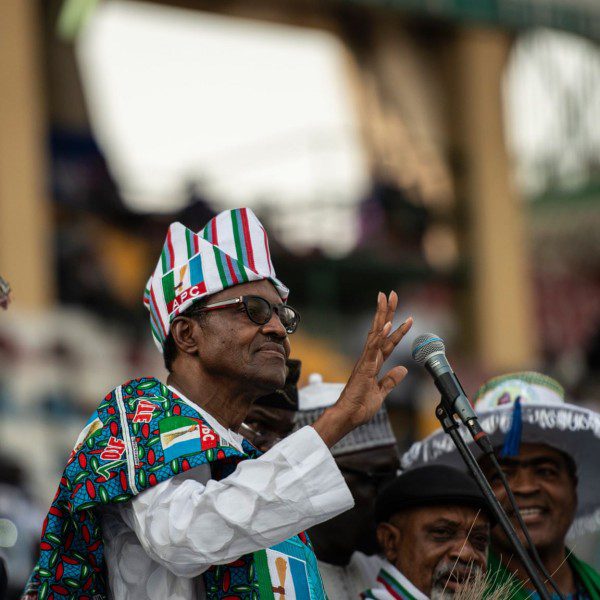

Ruth Maclean and Eromo Egbejule
Source – The Guardian
Nigeria’s president, who came to power with a pledge to tackle corruption, has said he needs more time to sort out the problem but has begun no successful prosecutions and has appeared to condone colleagues tainted by serious allegations.
Muhammadu Buhari was elected four years ago on a wave of disgust at the perceived avarice of Goodluck Jonathan’s administration – but as he fights for a second term in Saturday’s election, his efforts to bring corruption under control are widely seen as a failure.
Thousands of government supporters carrying twig brooms filled the streets of Surulere in Lagos, Nigeria’s southern megacity, on Saturday, waving them in the air to show their backing for the president and his anti-corruption drive.
Muhammadu Buhari was elected four years ago – but as he fights for a second term in Saturday’s election, his efforts to bring corruption under control are widely seen as a failure.
“It’s a broom – broom revolution,” thundered Bola Tinubu, a ruling party grandee, addressing the crowd that had gathered for Buhari’s “mega-rally”. “Broom broom!” he continued, imitating a motorbike as his fans swept the sky. Mai Gaskiya – Mr Honesty – has long been the ascetic-looking Buhari’s nickname, and his personal reputation as a lone squeaky-clean man in a sea of corrupt Nigerian politicians has survived his first term.
“This is the only president no British prime minister can call a thief,” said Adams Oshiomhole, chairman of Buhari’s APC party, referring to the time David Cameron was caught on camera on the eve of anti-graft summit telling the Queen that Nigeria was “fantastically corrupt”. At the summit, Buhari was asked if his country really was as corrupt as Cameron portrayed it. “Yes,” he said simply, after a pause.
A former secretary to the federation who allegedly diverted 270m naira (£578,000) of funds meant for people displaced by Boko Haram to accounts linked to him was only charged last month, two years after being indicted by the Senate
But nearly three years later, rumours of corruption are again swirling around the president’s men. None of the many corruption cases initiated by the administration has ended in a conviction. A former secretary to the federation who allegedly diverted 270m naira (£578,000) of funds meant for people displaced by Boko Haram to accounts linked to him was only charged last month, two years after being indicted by the Senate. It took months of pressure from the press and parliament for him to be fired; he is currently one of the leaders of the president’s campaign in his home state of Adamawa.
At least two ministers had petitions against them for misappropriation of funds as governors of Lagos and Rivers, the two biggest state economies. Last October, Oshiomhole, also a former state governor, was served papers by a federal high court for fraud perpetuated in office; a month later, the secret police interrogated him for collecting bribes to subvert party primaries nationwide. Transparency International said Nigeria had not moved in its latest corruption perception index released last month.
Source: The Guardian
Ruth Maclean is the West Africa correspondent for the Guardian.
Eromo Egbejule is a Nigerian writer and journalist. In 2014, he was a recipient of the Prince Claus grant for culture and development.
